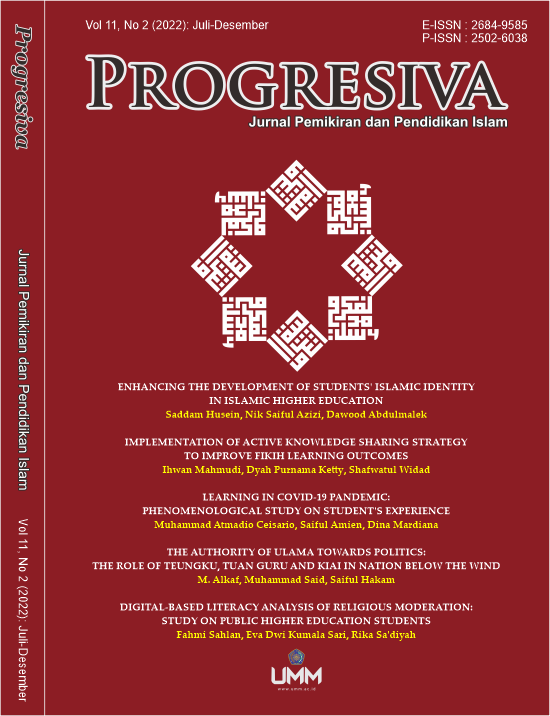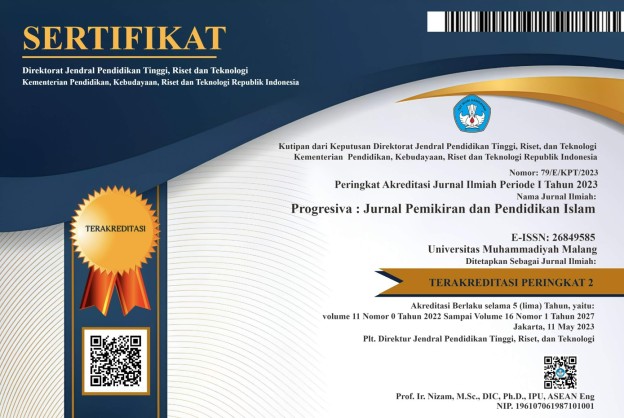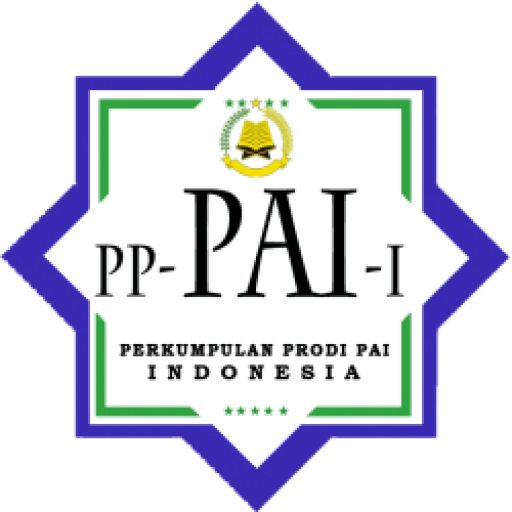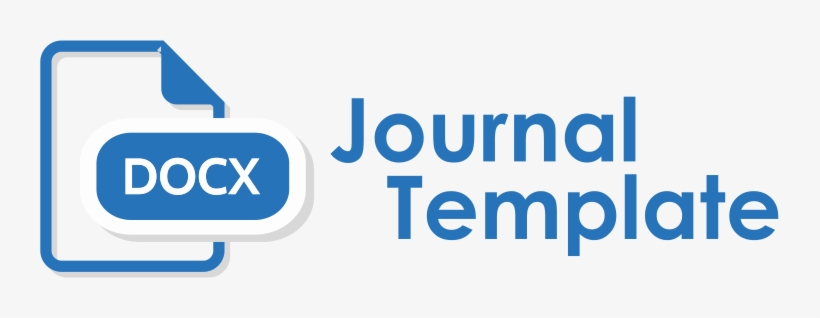Digital-Based Literacy Analysis of Religious Moderation: Study on Public Higher Education Students
DOI:
https://doi.org/10.22219/progresiva.v11i02.20906Keywords:
Digital, Literacy, Religious Moderation, Higher EducationAbstract
The purpose of this study was to find out the sources of religious Literacy for Private College students in Bekasi City based on increasing their religious insight, as well as to find out which sources were related to religious moderation. The digital-based religious literacy sources referred to in this study are religious sources and networks of religious resources commonly accessed by students to increase religious insight and knowledge. This study uses a descriptive quantitative approach with survey—research data collection by questionnaire, using google form. Document data or questionnaires are analyzed for their content to conclude reflectively. The results showed 1) the enthusiasm of students in finding sources of digital-based religious literacy was tremendous, students tended to seek religious information of their choice through the Internet and social media they had, including surfing on Google, Instagram, Youtube, Facebook, WhatsApp, Tiktok, and religious websites. 2) religious literacy is chosen by students seeking religious insight through the preacher who is active in cyberspace because they consider listening to lectures via the Internet to be practical, easy to obtain, and easy to understand the contents of the lectures. 3) the platforms or websites they visit tend to be mainstream lecturers. Therefore, it is necessary to pay special attention to the rectorate and the Ministry of Religion to explore the contents accessed by students to create religious moderation among students.
Downloads
References
Abdullah, S. D. A. (2018). Peran Hanan Attaki Dalam Membangun Persepsi Generasi Milenial Tentang Tuhan (Analisis Isi Atas Video €Œkangen†Di Youtube). Jurnal Ilmiah Mahasiswa Raushan Fikr, 7(1), 65–74. https://doi.org/10.24090/jimrf.v7i1.2206
Afdhal, M., & Hamzah, H. (2019). An Analysis of Verbal Humor in Preaching of Ustadz Abdul Somad. English Language and Literature, 8(3). https://doi.org/10.24036/ell.v8i3.105773
Ananda, T. T. (2021). Adopsi Inovasi Komunitas Gerakan Pemuda Hijrah Terhadap Dakwah Online Pemuda Hijrah Shift Media. Dakwah: Jurnal Kajian Dakwah Dan Kemasyarakatan, 25(2), 134–157. https://doi.org/10.15408/dakwah.v25i2.23234
Bakti, A. F. (2018). Media and religion: Rodja tv's involvement in the civil society discourse for community development. Jurnal Komunikasi: Malaysian Journal of Communication, 34(3), 226–244. https://doi.org/10.17576/JKMJC-2018-3403-13
Cahyono, G. (2019). Pemanfaatan Media Youtube Dakwah Ustadz Adi Hidayat dalam Pengembangan Materi Fikih Madrasah Ibtidaiyah. At-Tarbawi: Jurnal Kajian Kependidikan Islam, 4(1), 78. https://doi.org/10.22515/attarbawi.v4i1.1474
Cresswell, J. W. (2015). Educational Research. Palnnung, Conducting and Wvaluating Quantittaive and Qualitative Research Boston: Pearson 2015. Person.
Dinham, A., & H Jones, S. (2010). Religious Literacy Leadership in Higher Education. In Religious Literacy Leadership.
Haq, F. K., Shulthoni, M., & Mukhlis, F. (2022). Tariq Ramadan's View on Western Muslims Identity: Between Nation and God's Revelation. Progresiva: Jurnal Pemikiran …, 10(1), 55–69. https://doi.org/10.22219/progresiva.v11i01.20496
Hobbs, R., & Frost, R. (2003). Measuring The Acquisition of Media Literacy Skill. Reading Research Quarterify, 38(3), 330–355.
Jahroni, J., & Abu Bakar, I. (2019). Masjid di Era Milenial: Arah Baru Literasi Keagamaan. Center for the Study of Religion and Culture (CSRC).
Maulana, D. (2017). The Exclusivism of Religion Teachers: Intolerance and Radicalism in Indonesian Public Schools. Studia Islamika, 24(2).
Moore, D. L. (2006). Overcoming Religious Illiteracy: A Cultural Studies Approach. World History Connected, 4(1).
Mukhlis, F. (2020). Sunan Drajat’s Influences to Islamic Education: 15th Century. Progresiva : Jurnal Pemikiran Dan Pendidikan Islam, 8(2), 97. https://doi.org/10.22219/progresiva.v8i2.11038
Muthohirin, N. (2021). Da’wa in Social Media: TheViews of Ustad Hanan Attaki and Felix Siauw to The Hijrah Phenomenon. Afkaruna: Indonesian Interdisciplinary Journal of Islamic Studies, 17(2). https://doi.org/doi.org/10.18196/afkaruna.v17i2.12554
Muthohirin, N., Kamaludin, M., & Mukhlis, F. (2022a). Salafi Madrasas: Ideology, Transformation, and Implication for Multiculturalism in Indonesia. Fikrah, 10(1), 81. https://doi.org/10.21043/fikrah.v10i1.14380
Muthohirin, N., Kamaludin, M., & Mukhlis, F. (2022b). Transformasi Pendidikan Islam Salafi: Implikasi terhadap Multikulturalisme di Indonesia. The Annual Conference on Islamic Religious Education, 2(1), 1–24. http://acied.pp-paiindonesia.org/index.php/acied/article/view/14%0Ahttp://acied.pp-paiindonesia.org/index.php/acied/article/viewFile/14/22
Nazar, N., & Qoulan Sadida. (2022). Penerapan Prinsip Komunikasi Qaulan Sadida Dalam Dakwah Ustadz Adi Hidayat Di Channel Youtube Adi Hidayat Official. JOISCOM (Journal of Islamic Communication), 3(2). https://doi.org/10.36085/joiscom.v3i2.3774
Parhan, M., Riezky, P. A., Alifa, S., & Riezky Sarah Alifa, P. (2020). Analisis Metode Baru Dakwah Hanan Attaki Di Era Konvergensi Media:(Studi Deskriptif Pada Akun Instagram @Hanan_Attaki) ANALISIS METODE BARU DAKWAH HANAN ATTAKI DI ERA KONVERGENSI MEDIA (Studi Deskriptif Pada Akun Instagram @hanan_attaki). Komunida: Media Komunikasi Dan Dakwah, 10, 175–196. https://doi.org/10.35905/komunida.v7i2.http
Ridho, M. (2019). Ustadz Abdul Somad and the Future of Online Da’wa in Indonesia. Borneo International Journal of Islamic Studies, 1(2), 147–158. https://doi.org/10.21093/bijis.v1i2.1578
Sanjaya, M., Bakti, A. F., Sigit, R. R., & Nasrullah, R. (2022). Reinterpellation And Reimitation Of Conservative Ideology Of Salafi Through The Mediatization Of Religion On Instagram Rodja Tv. Eduvest - Journal of Universal Studies, 2(10), 1985–1997. https://doi.org/10.36418/eduvest.v2i10.615
Zada, K. (2009). Radikalisme di Jantung Pendidikan Islam. Edukasi: Jurnal Pendidikan Agama Dan Keagamaan, 7(1).
Downloads
Published
How to Cite
Issue
Section
License
Copyright (c) 2022 Fahmi Sahlan, Eva Dwi Kumala Sari, Rika Sa'diyah

This work is licensed under a Creative Commons Attribution-ShareAlike 4.0 International License.


















